Shows
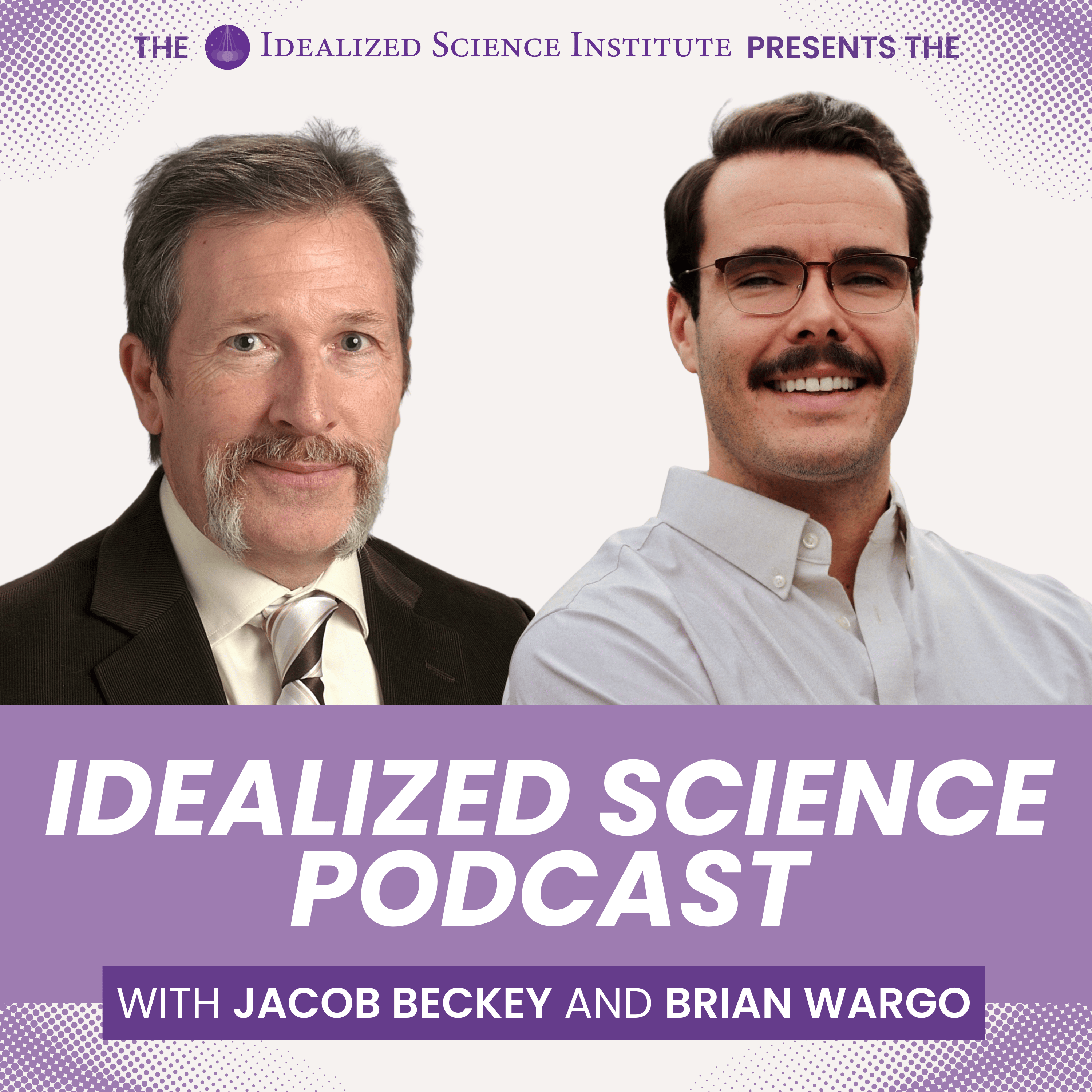
Idealized ScienceExploring the Infinite Powers of Calculus with Professor Steven StrogatzThe Idealized Science Podcast -- Season 2 Ep. 02 -- Infinite Powers with Prof. Steven Strogatz In this episode of the Idealized Science Podcast, hosts Jacob Beckey and Dr. Brian Wargo engage with Professor Steven Strogatz to explore the themes of calculus, teaching, and the importance of history in mathematics. Strogatz shares insights from his book 'Infinite Powers,' discussing the beauty of calculus, the significance of real-world applications, and the role of educators in inspiring students. The conversation delves into the challenges faced by teachers, the need for a deeper understanding of math concepts, and the impact of...
2025-11-211h 09
The Joy of WhyHow Can Math Protect Our Data?Every time data travels — from smartphones to the cloud, or across the vacuum of space — it relies on a silent but vigilant guardian in the form of error-correcting codes. These codes, baked into nearly every digital system, are designed to detect and repair any errors that noise, interference or cosmic rays might inflict.In this episode of The Joy of Why, Stanford computer scientist Mary Wootters joins co-host Steven Strogatz to explain how these codes work, and why they matter more than ever. Wootters discusses the evolving list of codes that keep modern communication resilient, and the fron...
2025-08-0739 min
The Joy of WhyHow Can Regional Models Advance Climate Science?Climate models have changed the way we view the world. While effective, these models are imperfect, and scientists are constantly looking at ways to improve their accuracy and predictability.MIT professor Elfatih Eltahir has spent decades developing complex models to understand how climate change affects vulnerable regions like the Nile Basin and Singapore. In this episode of The Joy of Why, Eltahir tells co-host Steven Strogatz how growing up near the Nile in Sudan helped him realize that climate change doesn’t occur in isolation. To better understand climate-related impacts and to create more effective adaptation strategies, El...
2025-07-1045 min
The Joy of WhyDoes Form Really Shape Function?What links a Möbius strip, brain folds and termite mounds? The answer is Harvard University’s L. Mahadevan, whose career has been devoted to using mathematics and physics to explore the form and function of common phenomena.Mahadevan, or Maha to his friends and colleagues, has long been fascinated by questions one wouldn’t normally ask — from the equilibrium shape of inert objects like a Möbius strip, to the complex factors that drive biological systems like morphogenesis or social insect colonies.In this episode of The Joy of Why, Mahadevan tells co-host Steven Strogatz...
2025-06-1247 min
The Joy of WhyHow Did Geometry Create Modern Physics?Geometry is one of the oldest disciplines in human history, yet the worlds it can describe extend far beyond its original use. What began thousands of years ago as a way to measure land and build pyramids was given rigor by Euclid in ancient Greece, became applied to curves and surfaces in the 19th century, and eventually helped Einstein understand the universe.Yang-Hui He sees geometry as a unifying language for modern physics, a mutual exchange in which each discipline can influence and shape the other. In the latest episode of The Joy of Why, He tells...
2025-05-1546 min
The Joy of WhyS4 Preview: More Big Questions and No SasquatchesHow did complex life evolve? Where did space-time come from? Will computers ever understand language like we do? How did geometry create modern physics? These are just a few of the big and bold questions that we’ll be exploring in the latest season of Quanta’s interview podcast, “The Joy of Why,” starting March 20, and released every other Thursday.As ever, we will be talking to researchers and exploring the latest thinking on great scientific and mathematical questions of our time. But this season sees a new format, with the two of us — mathematician Steven Strogatz and physic...
2025-03-1317 min
The Joy of WhyHow Is Cell Death Essential to Life?Death might seem like a pure loss, the disappearance of what makes a living thing distinct from everything else on our planet. But zoom in closer, to the cellular level, and death takes on a different, more nuanced meaning. There is a challenge in simply defining what makes an individual cell alive or dead. Scientists today are working to understand the various ways and reasons that cells disappear, and what these processes mean to biological systems. In this episode, cellular biologist Shai Shaham talks to Steven Strogatz about the different forms of cell death, their roles in e...
2024-12-0538 min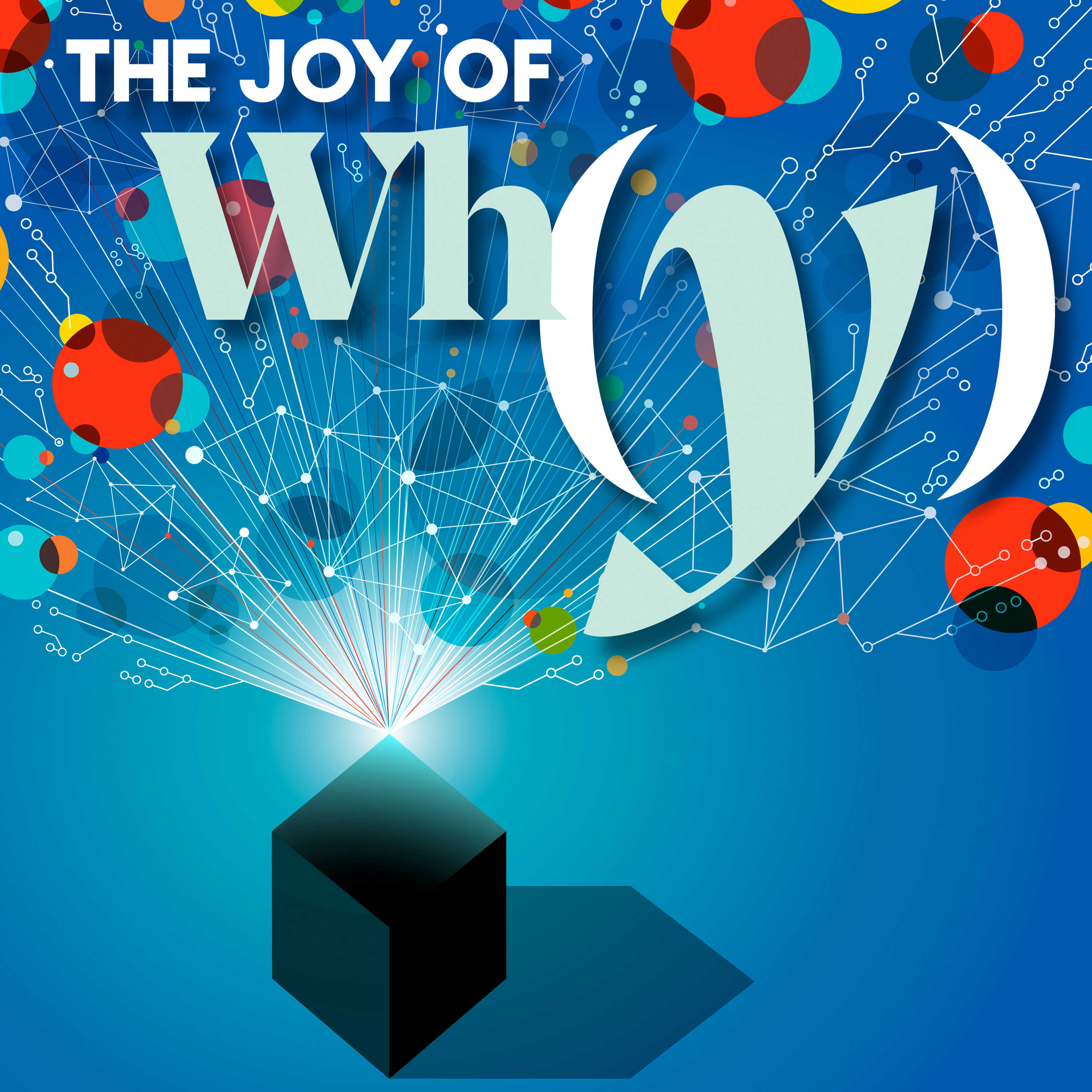
The Joy of WhyHow Is AI Changing the Science of Prediction?Scientists routinely build quantitative models — of, say, the weather or an epidemic — and then use them to make predictions, which they can then test against the real thing. This work can reveal how well we understand complex phenomena, and also dictate where research should go next. In recent years, the remarkable successes of “black box” systems such as large language models suggest that it is sometimes possible to make successful predictions without knowing how something works at all. In this episode, noted statistician Emmanuel Candès and host Steven Strogatz discuss using statistics, data science an...
2024-11-0737 min
The Joy of WhyHow Can Math Help Beat Cancer?When we think about medicine’s war on cancer, treatments such as surgery, radiation and chemotherapy spring to mind first. Now there is another potential weapon for defeating tumors: statistics and mathematical models that can optimize the selection, combination or timing of treatment. Building and feeding these models requires accounting for the complexity of the body, and recognizing that cancer cells are constantly evolving. In this episode, host Steven Strogatz hears from Franziska Michor, a computational biologist, about how our understanding of evolutionary dynamics is being used to devise new anticancer therapies.
2024-10-1042 min
The Joy of WhyCan Thermodynamics Go Quantum?The principles of thermodynamics are cornerstones of our understanding of physics. But they were discovered in the era of steam-driven technology, long before anyone dreamed of quantum mechanics. In this episode, theoretical physicist Nicole Yunger Halpern talks to host Steven Strogatz about how physicists today are reinterpreting concepts such as work, energy and information for a quantum world.
2024-09-1243 min
The Joy of WhyAre Robots About to Level Up?Within just a few years, artificial intelligence systems that sometimes seem to display almost human characteristics have gone from science fiction to apps on your phone. But there’s another AI-influenced frontier that is developing rapidly and remains untamed: robotics. Can the technologies that have helped computers get smarter now bring similar improvements to the robots that will work alongside us? In this episode, Daniela Rus, a pioneering roboticist at the Massachusetts Institute of Technology, talks to host Steven Strogatz about the surprising inspirations from biology that may help robots rise to new levels.
2024-08-1538 min
The Joy of WhyAre Robots About to Level Up?Within just a few years, artificial intelligence systems that sometimes seem to display almost human characteristics have gone from science fiction to apps on your phone. But there’s another AI-influenced frontier that is developing rapidly and remains untamed: robotics. Can the technologies that have helped computers get smarter now bring similar improvements to the robots that will work alongside us? In this episode, Daniela Rus, a pioneering roboticist at the Massachusetts Institute of Technology, talks to host Steven Strogatz about the surprising inspirations from biology that may help robots rise to new levels.
2024-08-1538 min
The Joy of WhyWill AI Ever Have Common Sense?Ask a question of ChatGPT and other, similar chatbots and there’s a good chance you’ll be impressed at how adeptly it comes up with a good answer — unless it spits out unrealistic nonsense instead. Part of what’s mystifying about these kinds of machine learning systems is that they are fundamentally black boxes. No one knows precisely how they arrive at the answers that they do. Given that mystery, is it possible that these systems in some way truly understand the world and the questions they answer? In this episode, the computer scientist Yejin Choi of the Universi...
2024-07-1844 min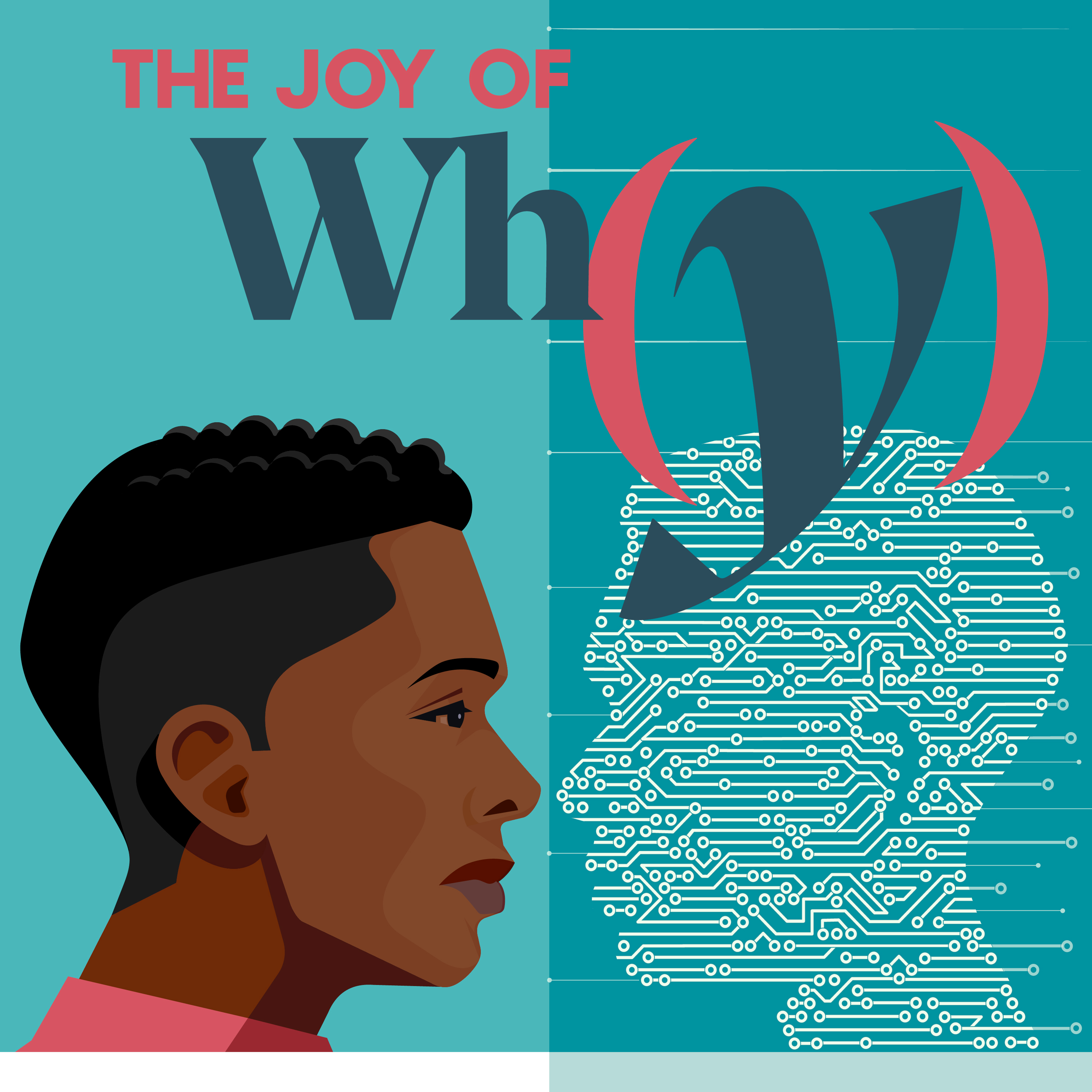
The Joy of WhyWill AI Ever Have Common Sense?Common sense rules our world. This fundamental, sometimes trivial knowledge is inherent to how humans interpret language. Yet, some of these simple human truths are so obvious that they're rarely put into words. And without the data of common sense to train on, large language models such as ChatGPT have bizarre, often humorous blind spots.Yejin Choi, professor and the chair of computer science at the University of Washington, calls common sense the “dark matter” of intelligence. In this week’s episode of “The Joy of Why,” Choi talks with co-host Steven Strogatz about decoding t...
2024-07-1844 min
The Joy of WhyHow Is Science Even Possible?The universe seems like it should be unfathomably complex. How then is science able to crack fundamental questions about nature and life? Scientists and philosophers alike have often commented on the “unreasonable” success of mathematics at describing the universe. That success has helped science probe some profound mysteries — but as the physicist Nigel Goldenfeld points out, it also helps that the “hard” physical sciences, where this progress is most evident, are in major ways simpler than the “soft” biological sciences.
In this episode, Goldenfeld speaks with co-host Steven Strogatz about the scientific importance of asking the right questions at t...
2024-06-2035 min
The Joy of WhyHow Is Science Even Possible?The universe seems like it should be unfathomably complex. How then is science able to crack fundamental questions about nature and life? Scientists and philosophers alike have often commented on the “unreasonable” success of mathematics at describing the universe. That success has helped science probe some profound mysteries — but as the physicist Nigel Goldenfeld points out, it also helps that the “hard” physical sciences, where this progress is most evident, are in major ways simpler than the “soft” biological sciences.In this episode, Goldenfeld speaks with co-host Steven Strogatz about the scientific importance of asking the right questions at t...
2024-06-2035 min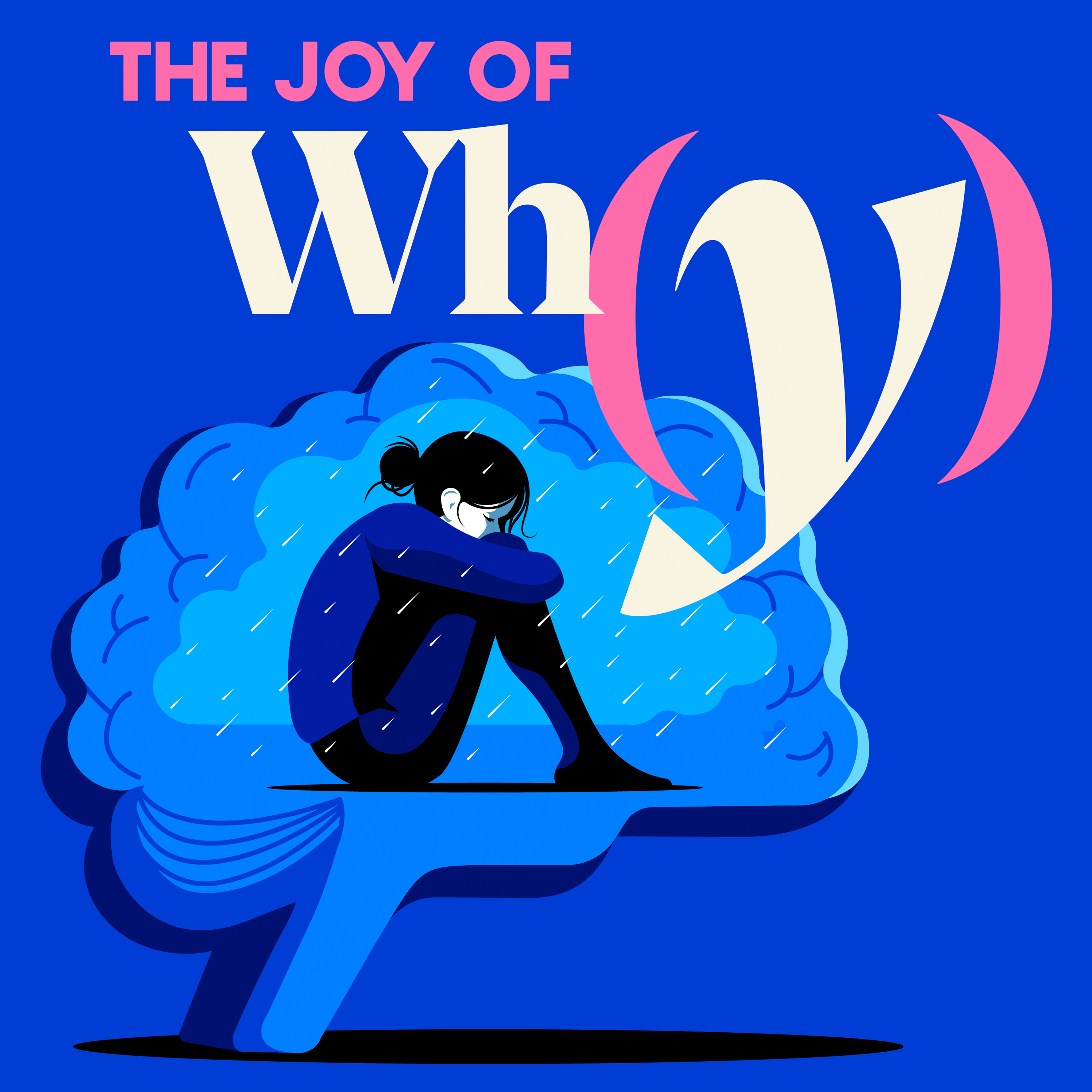
The Joy of WhyWhat Happens in the Brain to Cause Depression?For decades, the best drug therapies for treating depression, like SSRIs, have been based on the idea that depressed brains don’t have enough of the neurotransmitter serotonin. Yet for almost as long, it’s been clear that simplistic theory is wrong. Recent research into the true causes of depression is finding clues in other neurotransmitters and the realization that the brain is much more adaptable than scientists once imagined. Treatments for depression are being reinvented by drugs like ketamine that can help regrow synapses, which can in turn restore the right brain chemistry and improve whole body health.
2024-05-2333 min
The Joy of WhyWhat Does Milk Do for Babies?Milk is more than just a food for babies. Breast milk has evolved to deliver thousands of diverse molecules including growth factors, hormones and antibodies, as well as microbes.
Elizabeth Johnson, a molecular nutritionist at Cornell University, studies the effects of infants’ diet on the gut microbiome. These studies could hold clues to hard questions in public health for children and adults alike. In this episode of “The Joy of Why” podcast, co-host Steven Strogatz interviews Johnson about the microbial components that make breast milk one of the most wondrous biofluids found in nature.
Listen on App...
2024-04-2534 min
The Joy of WhyWhat Does Milk Do for Babies?Milk is more than just a food for babies. Breast milk has evolved to deliver thousands of diverse molecules including growth factors, hormones and antibodies, as well as microbes.
Elizabeth Johnson, a molecular nutritionist at Cornell University, studies the effects of infants’ diet on the gut microbiome. These studies could hold clues to hard questions in public health for children and adults alike. In this episode of “The Joy of Why” podcast, co-host Steven Strogatz interviews Johnson about the microbial components that make breast milk one of the most wondrous biofluids found in nature.
You can re...
2024-04-2534 min
The Joy of WhyHow Is Flocking Like Computing?Birds flock. Locusts swarm. Fish school. Within assemblies of organisms that seem as though they could get chaotic, order somehow emerges. The collective behaviors of animals differ in their details from one species to another, but they largely adhere to principles of collective motion that physicists have worked out over centuries. Now, using technologies that only recently became available, researchers have been able to study these patterns of behavior more closely than ever before.
In this episode, the evolutionary ecologist Iain Couzin talks with co-host Steven Strogatz about how and why animals exhibit collective behaviors, flocking as a...
2024-03-2939 min
The Joy of WhyHow Is Flocking Like Computing?Birds flock. Locusts swarm. Fish school. In these chaotic assemblies, order somehow emerges. Collective behaviors differ in their details from one species to another, but they largely adhere to principles of collective motion that physicists have worked out over centuries. Now, using technologies that only recently became available, researchers have been able to study these patterns of collective animal behavior more closely than ever before. These new insights are unlocking some of the secret fitness advantages of living as part of a group rather than as an individual. The improved understanding of swarming pests such as locusts could also...
2024-03-2839 min
The Joy of WhyWhat Is the Nature of Time?Time seems linear to us: We remember the past, experience the present and predict the future, moving consecutively from one moment to the next. But why is it that way, and could time ultimately be a kind of illusion? In this episode, the Nobel Prize-winning physicist Frank Wilczek speaks with host Steven Strogatz about the many “arrows” of time and why most of them seem irreversible, the essence of what a clock is, how Einstein changed our definition of time, and the unexpected connection between time and our notions of what dark matter might be.
2024-02-2930 min
The Joy of WhyWhat Is the Nature of Time?Time seems linear to us: We remember the past, experience the present and predict the future, moving consecutively from one moment to the next. But why is it that way, and could time ultimately be a kind of illusion? In this episode, the Nobel Prize-winning physicist Frank Wilczek speaks with host Steven Strogatz about the many “arrows” of time and why most of them seem irreversible, the essence of what a clock is, how Einstein changed our definition of time, and the unexpected connection between time and our notions of what dark matter might be.
2024-02-2930 min
Murakamy Podcast#69 Wie navigiert man in Komplexität Prof. Dirk Brockmann?In dieser Episode ist Prof. Dr. Dirk Brockmann zu Gast im Murakamy Podcast. Dirk ist Komplexitätsforscher am Institut für Biologie der Humboldt-Universität zu Berlin und Wissenschaftler am Robert Koch-Institut, besser bekannt als RKI. Er ist Autor des Buches "Im Wald vor lauter Bäumen: Unsere komplexe Welt besser verstehen" und jemand, der bewusst fachliche Grenzen überschreitet. Dirk und Marco tauchen in dem Gespräch tief ein in die Themen Kooperation, Symbiose, Innovation und auch ein Stück in die Netzwerktheorie. Gemeinsam betrachten sie, wie die Zusammenarbeit von Menschen und Organismen zu bahnbrechenden Entdeckungen geführt hat und analysie...
2024-02-081h 38
The Joy of WhyWhat Makes for 'Good' Math?We tend to think of mathematics as purely logical, but the teaching of math, its usefulness and its workings are packed with nuance. So what is “good” mathematics? In 2007, the mathematician Terence Tao wrote an essay for the “Bulletin of the American Mathematical Society” that sought to answer this question. Today, as the recipient of a Fields Medal, a Breakthrough Prize in Mathematics and a MacArthur Fellowship, Tao is among the most prolific mathematicians alive. In this episode, he joins Steven Strogatz to revisit the makings of good mathematics.
2024-02-0135 min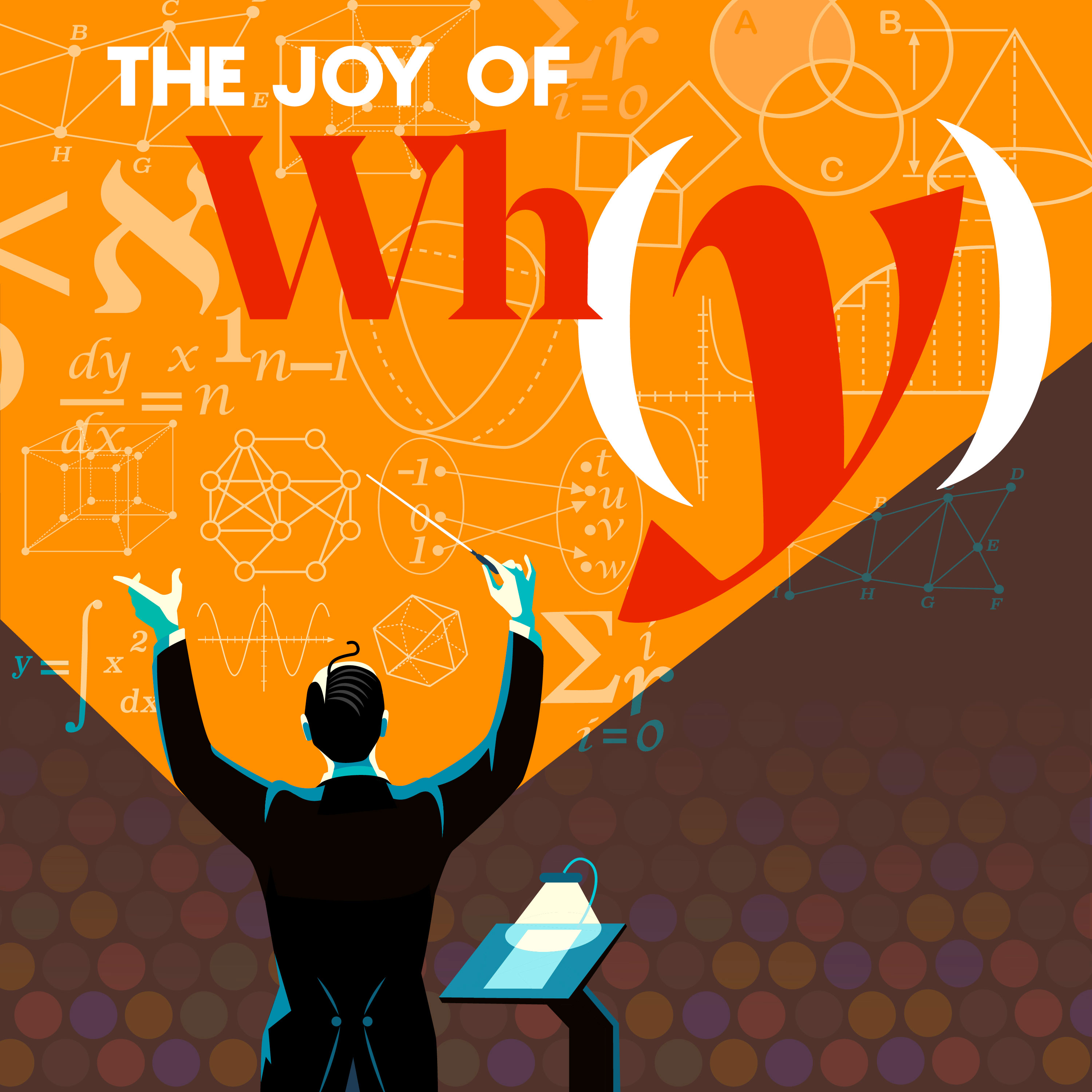
The Joy of WhyWhat Makes for ‘Good’ Math?We tend to think of mathematics as purely logical, but the teaching of math, its usefulness and its workings are packed with nuance. So what is “good” mathematics? In 2007, the mathematician Terence Tao wrote an essay for the “Bulletin of the American Mathematical Society” that sought to answer this question. Today, as the recipient of a Fields Medal, a Breakthrough Prize in Mathematics and a MacArthur Fellowship, Tao is among the most prolific mathematicians alive. In this episode, he joins Steven Strogatz to revisit the makings of good mathematics.
2024-02-0135 min
The Joy of WhyS4 Preview: More Big Questions and No SasquatchesHow did complex life evolve? Where did space-time come from? Will computers ever understand language like we do? How did geometry create modern physics? These are just a few of the big and bold questions that we’ll be exploring in the latest season of Quanta’s interview podcast, “The Joy of Why,” starting March 20, and released every other Thursday.As ever, we will be talking to researchers and exploring the latest thinking on great scientific and mathematical questions of our time. But this season sees a new format, with the two of us — mathematician Steven Strogatz and physic...
2024-01-2517 min
The Joy of WhyWhy Locusts Swarm, Humans Do Good and Time Marches On“The Joy of Why” is a Quanta Magazine podcast about curiosity and the pursuit of knowledge. The mathematician and author Steven Strogatz and the astrophysicist and author Janna Levin take turns interviewing leading researchers about the great scientific and mathematical questions of our time. New episodes are released every other Thursday.
2024-01-2502 min
The Joy of WhyTrailer: The Joy of Why Season 3Tune in to the new season of ‘The Joy of Why,’ a podcast from Quanta Magazine and PRX. This season, new co-host cosmologist Janna Levin and mathematician Steven Strogatz will be joined by guests including Terence Tao, the mathematician and Fields Medalist, and Frank Wilczek, the Nobel Prize-winning physicist. New episodes premiere every other Thursday.
2024-01-2502 min
English Academic Vocabulary Booster5208. 231 Academic Words Reference from "Steven Strogatz: The science of sync | TED Talk"This podcast is a commentary and does not contain any copyrighted material of the reference source.
We strongly recommend accessing/buying the reference source at the same time.
■Reference Source
https://www.ted.com/talks/steven_strogatz_the_science_of_sync
■Post on this topic (You can get FREE learning materials!)
https://englist.me/231-academic-words-reference-from-steven-strogatz-the-science-of-sync-ted-talk/
■Youtube Video
https://youtu.be/RjFvV1LR3ew (All Words)
https://youtu.be/Gd3amUfPmtE (Advanced Words)
https://youtu.be/spvONfiH0bU (Quick...
2023-09-263h 23
The Joy of WhyDoes Nothingness Exist?Even empty space bubbles with energy, according to quantum mechanics — and that fact affects almost every facet of physical reality. The theoretical physicist Isabel Garcia Garcia explains to Steven Strogatz why it’s so important in modern physics to understand what a true vacuum is.
The post Does Nothingness Exist? first appeared on Quanta Magazine
2023-07-2644 min
The Joy of WhyCan Math and Physics Save an Arrhythmic Heart?Abnormal waves of electrical activity can cause a heart’s muscle cells to beat out of sync. In this episode, Flavio Fenton, an expert in cardiac dynamics, talks with Steve Strogatz about ways to treat heart arrhythmias without resorting to painful defibrillators.
The post Can Math and Physics Save an Arrhythmic Heart? first appeared on Quanta Magazine
2023-07-1246 min
LA Theatre WorksThe Relativity Series Bonus: Dr. Steven Strogatz Interview for ArcadiaHear our interview with Steven Strogatz, a professor at the Cornell University School of Theoretical and Applied Mathematics, helping us to understand chaos theory and how it figures in "Arcadia."This piece is part of L.A. Theatre Works’ Relativity Series featuring science-themed plays. Lead funding for the Relativity Series is provided by the Alfred P. Sloan Foundation, bridging science and the arts in the modern world.See Privacy Policy at https://art19.com/privacy and California Privacy Notice at https://art19.com/privacy#do-not-sell-my-info.
2023-07-1127 min
The Joy of WhyWhat Can Jellyfish Teach Us About Fluid Dynamics?Jellyfish and other aquatic creatures embody solutions to diverse problems in engineering, medicine and mathematics. John Dabiri, a fluid dynamics expert, talks with Steven Strogatz about what jellyfish can teach us about going with the flow.
The post What Can Jellyfish Teach Us About Fluid Dynamics? first appeared on Quanta Magazine
2023-06-2843 min
The Joy of WhyWhat Causes Giant Rogue Waves?Wave-science researcher Ton van den Bremer and Steven Strogatz discuss how rogue waves can form in relatively calm seas and whether their threat can be predicted.
The post What Causes Giant Rogue Waves? first appeared on Quanta Magazine
2023-06-1440 min
The Joy of WhyWhat Is the Nature of Consciousness?Consciousness, our experience of being in the world, is one of the mind’s greatest mysteries, but as the neuroscientist Anil Seth explains to Steven Strogatz, research is making progress in understanding this elusive phenomenon.
The post What Is the Nature of Consciousness? first appeared on Quanta Magazine
2023-05-3152 min
The Joy of WhyAre There Reasons to Believe in a Multiverse?Several areas of physics suggest reasons to think that unobservable universes with different natural laws could lie beyond ours. The theoretical physicist David Kaplan talks with Steven Strogatz about the mysteries that a multiverse would solve.
The post Are There Reasons to Believe in a Multiverse? first appeared on Quanta Magazine
2023-05-1748 min
The Joy of WhyIs Perpetual Motion Possible at the Quantum Level?A new phase of matter called a “time crystal” plays with our expectations of thermodynamics. The physicist Vedika Khemani talks with Steven Strogatz about its surprising quantum behavior.
The post Is Perpetual Motion Possible at the Quantum Level? first appeared on Quanta Magazine
2023-05-0436 min
The Joy of WhyHow Can Some Infinities Be Bigger Than Others?All infinities go on forever, so how is it possible for some infinities to be larger than others? The mathematician Justin Moore discusses the mysteries of infinity with Steven Strogatz.
The post How Can Some Infinities Be Bigger Than Others? first appeared on Quanta Magazine
2023-04-1946 min
The Joy of WhyWhat Has the Pandemic Taught Us About Vaccines?Should Covid-19 vaccines be judged by how well they prevent disease or how well they prevent death? Anna Durbin, a public health expert and vaccine researcher, talks with Steven Strogatz about the science behind vaccines.
The post What Has the Pandemic Taught Us About Vaccines? first appeared on Quanta Magazine
2023-04-0542 min
The Joy of WhyIs There Math Beyond the Equal Sign?Can mathematics handle things that are essentially the same without being exactly equal? Category theorist Eugenia Cheng and host Steven Strogatz discuss the power and pleasures of abstraction.
The post Is There Math Beyond the Equal Sign? first appeared on Quanta Magazine
2023-03-2249 min
The Joy of WhyCan We Program Our Cells?By genetically instructing cells to perform tasks that they wouldn't in nature, synthetic biologists can learn deep secrets about how life works. Steven Strogatz discusses the potential of this young field with researcher Michael Elowitz.
2023-03-0845 min
The Joy of WhyHow Will the Universe End?"The Joy of Why" is a podcast about curiosity and the pursuit of knowledge from Quanta Magazine. The acclaimed mathematician and author Steven Strogatz interviews leading researchers about the great scientific and mathematical questions of our time.
2023-02-2243 min
The Joy of WhyThe Joy of Asking About Infinity, Jellyfish and the End of the UniverseAs The Joy of Why podcast returns for a second season, producer Polly Stryker and host Steven Strogatz invite listeners to join them and their brilliant new guests on another voyage of discovery.
2023-02-0902 min
Radiolab Podcasts (Radiolab)The Middle of Everything EverAfter graduating from high school, without a clear plan for what to do next, Laura Andrews started asking herself a lot of questions. A spiral of big philosophical thoughts that led her to sit down and write to us with a question that was… oddly mathematical. What is the most average size thing, if you take into account everything in the universe. So, along with mathematician Steven Strogatz, we decided to see if we could sit down and, in a friendly throwdown of guesstimates and quick calculations, rough out an answer.
Special thanks to all the listeners who...
2022-12-0900 min
The Best PodcastsAfter graduating from high school, without a clear plan for what to do next, Laura Andrews started asking herself a lot of questions. A spiral of big philosophical thoughts that led her to sit down and write to us with a question that was… oddly mathematical. What is the most average size thing, if you take into account everything in the universe. So, along with mathematician Steven Strogatz, we decided to see if we could sit down and, in a friendly throwdown of guesstimates and quick calculations, rough out an answer.
Special thanks to all the listeners who...
2022-12-0900 min
The Joy of WhyWhy and How Do We Dream?Dreams are subjective and fleeting, but laboratories have developed ways of getting into the minds of people while they are dreaming. In this episode, Steven Strogatz speaks with sleep researcher Antonio Zadra about how new experimental methods have changed our understanding of dreams.
2022-08-2445 min
The Joy of WhyWhat Is Quantum Field Theory and Why Is It Incomplete?Quantum field theory may be the most successful scientific theory of all time, but there's reason to think it's missing something. Steven Strogatz speaks with theoretical physicist David Tong about this enigmatic theory.
2022-08-1042 min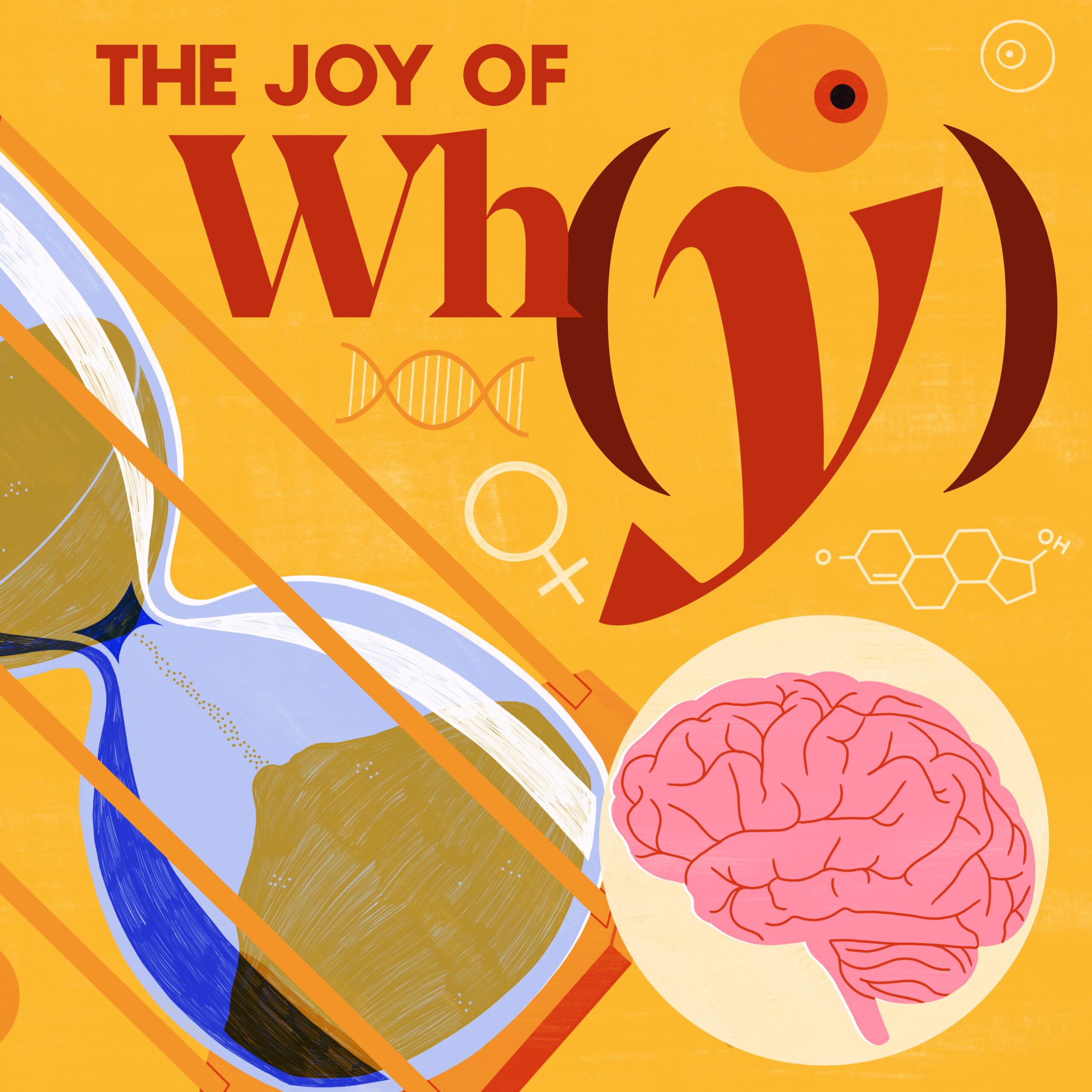
The Joy of WhyWhy Do We Get Old, and Can Aging Be Reversed?Everybody gets older, but not everyone ages in the same way. In this episode, Steven Strogatz speaks with Judith Campisi and Dena Dubal, two biomedical researchers who study the causes and outcomes of aging, to understand how age works - and what scientists know about postponing or even reversing the aging process.
2022-07-2738 min
A Que Curso Chegamos?#18 - Matemática/Guarapuava - A Que Curso Chegamos?#unicentro #vestibular #matemática #graduacao #universidade
No décimo oitavo episódio do “A que curso chegamos?” falamos sobre o curso de Matemática do Campus Cedeteg. Os convidados são os professores Rudinei Bogo e Carlos Roberto Ferreira, a egressa Fernanda Cebulski e asacadêmica Caroline de Farias Alves. O curso de Matemática é ofertado no Campus Cedeteg, em período noturno com duração de 4 anos e, a cada ano, 24 vagas são ofertadas pelo Vestibular, 4 vagas pelo PAC e 12 pelo Sisu, totalizando 40.
A que dicas chegamos -
O jogo da imitação...
2022-07-271h 04
The Joy of WhyCan Computers Be Mathematicians?Artificial intelligence has bested humans at problem-solving tasks including games like chess and Go. Is mathematics research next? Steven Strogatz speaks with Kevin Buzzard, professor of pure mathematics at Imperial College London, to learn about the ongoing multidisciplinary effort to translate math into language that computers understand.
2022-06-2932 min
The Joy of WhyWhat Is Life?Without a good definition of life, how do we look for it on alien planets? Steven Strogatz speaks with Robert Hazen, a mineralogist and astrobiologist, and Sheref Mansy, a chemist, to learn more.
2022-06-1541 min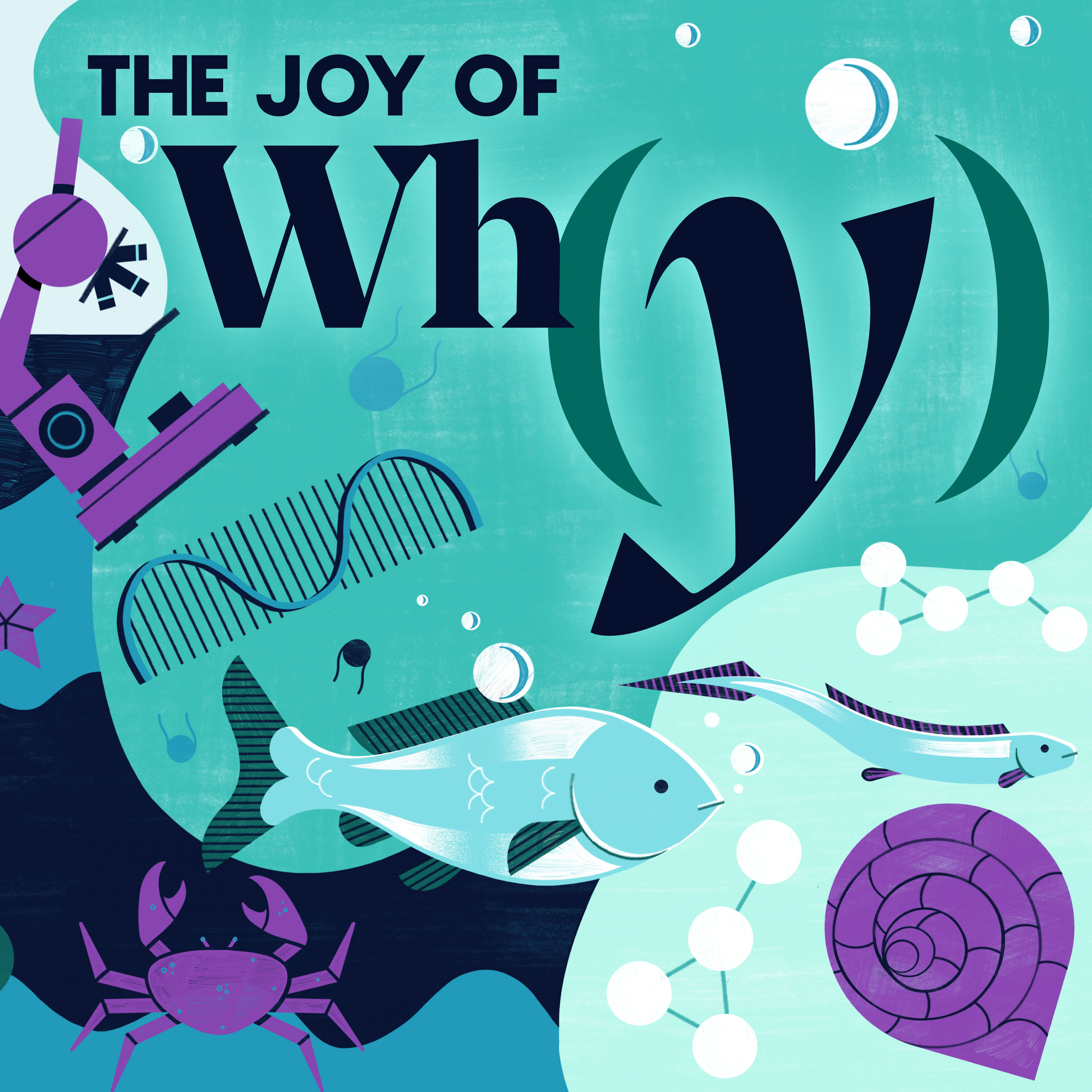
The Joy of WhyHow Could Life Evolve From Cyanide?How did life arise on Earth? It's one of the greatest and most ancient mysteries in all of science - and the clues to solving it are all around us. Steven Strogatz speaks with Jack Szostak, a Nobel Prize-winning biologist, and Betül Kaçar, a paleogeneticist and astrobiologist, to explore our best understanding of how we all got here.
2022-06-0139 min
The Joy of WhyWill the James Webb Space Telescope Reveal Another Earth?With the December 2021 launch of the James Webb Space Telescope, one of the most expensive and ambitious scientific initiatives ever attempted commenced operations. Now that the telescope has been successfully deployed in its unique position in space, its advanced instruments will be able to gather data on questions that scientists once could only dream of answering. Is there life on other planets? How do supermassive black holes mold the mass in their galaxies? JWST may soon be able to tell us. In this episode, host Steven Strogatz speaks to two researchers leading JWST's observations of our universe: Marcia Rieke...
2022-05-1849 min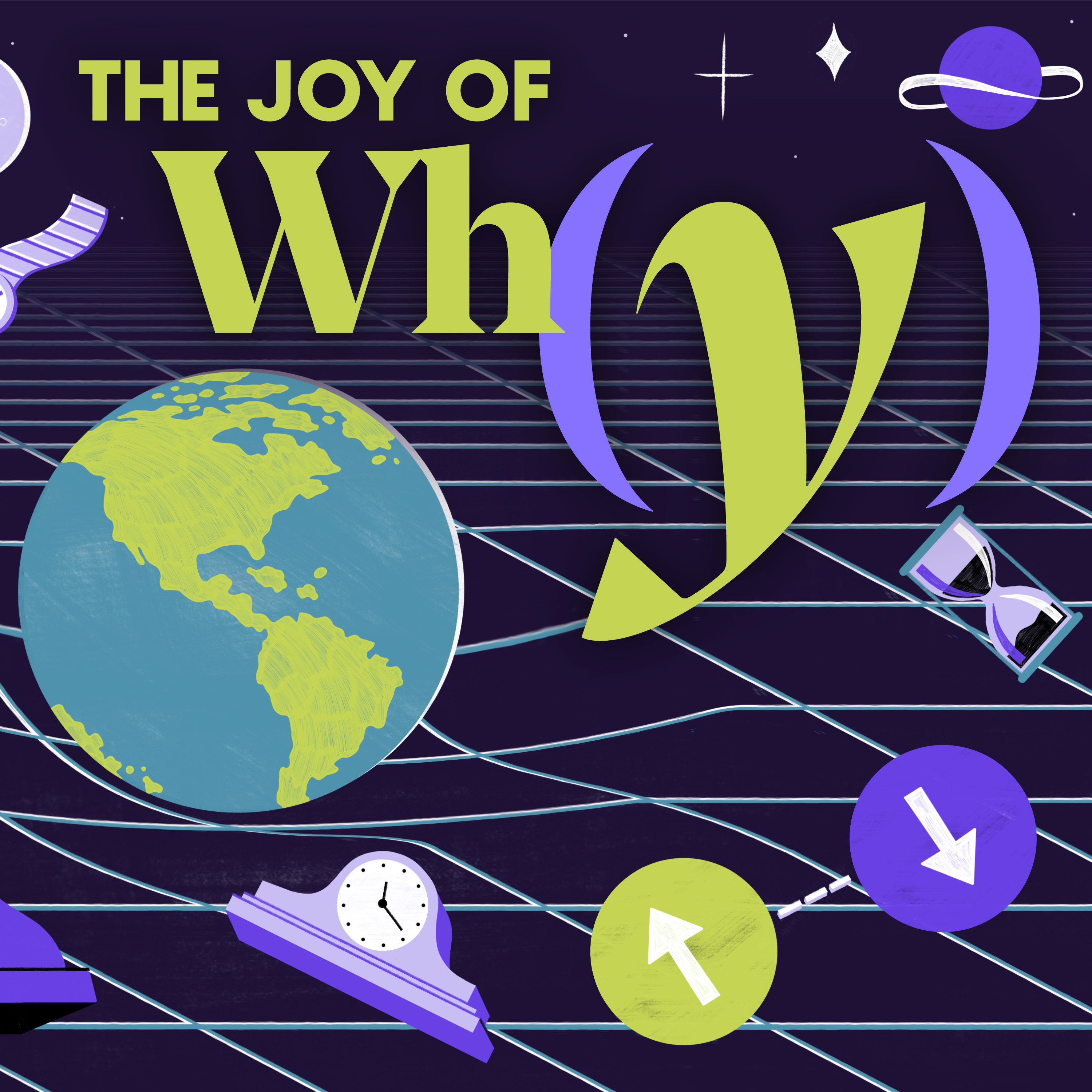
The Joy of WhyWhere Do Space, Time and Gravity Come From?Einstein's description of gravity as a curvature in space-time doesn't easily mesh with a universe made up of quantum wavefunctions. Theoretical physicist Sean Carroll (of the "Mindscape" podcast) tells Steven Strogatz about the mind-bending implications of the quest for quantum gravity.
2022-05-0442 min
The Joy of WhyWhy Is Inflammation a Dangerous Necessity?We've heard a lot about the immune system during the COVID-19 pandemic, but of course our immune system fights off much more than the coronavirus. And while the immune system protects us brilliantly from countless pathogens every day, sometimes it can also attack our own bodies, causing harmful and even deadly inflammation. In this episode, host Steven Strogatz speaks with Shruti Naik, an immunologist and assistant professor of biological sciences at NYU's Langone Medical Center, to learn why the immune system works so well - and how that effectiveness can backfire.
2022-04-2040 min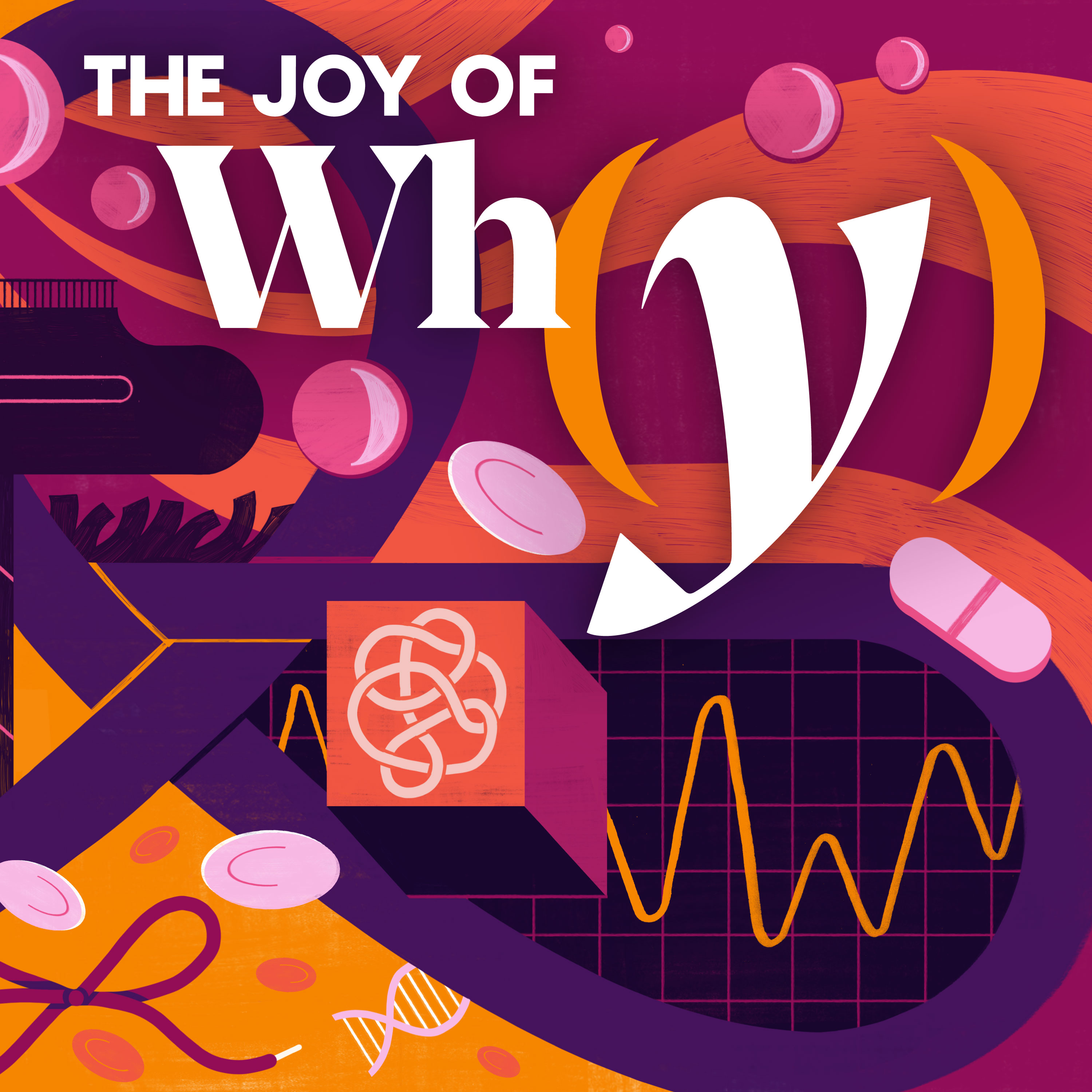
The Joy of WhyUntangling Why Knots Are ImportantEveryone knows what a knot is. But they have special significance in math and science because their properties can help unlock hidden secrets like the biochemistry of DNA or the geometry of three-dimensional spaces. In this episode, Steven Strogatz explores the mysteries of knots with the mathematicians Colin Adams and Lisa Piccirillo.
2022-04-0644 min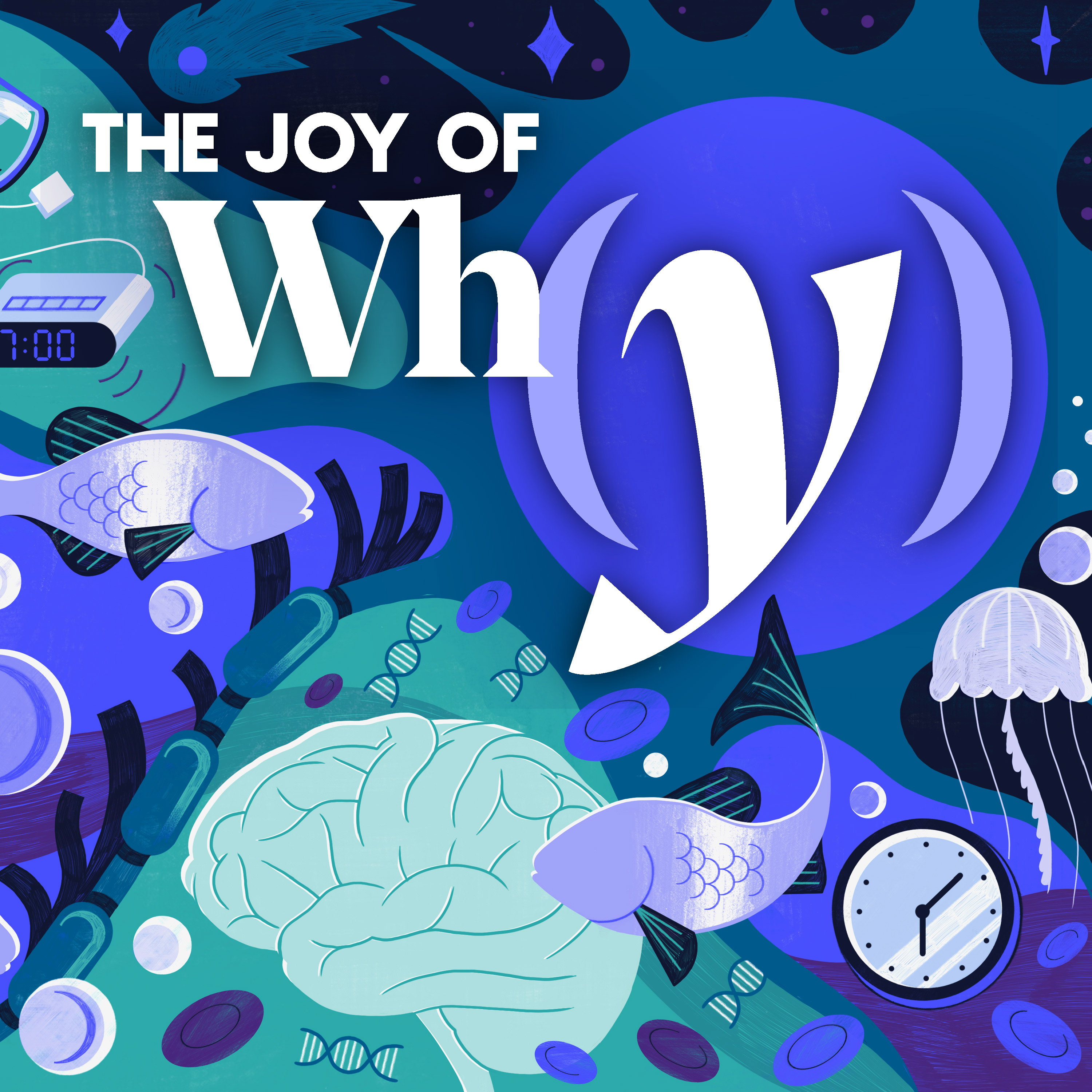
The Joy of WhyWhy Do We Die Without Sleep?Why do we need sleep? In the search for answers, scientists have uncovered more thought-provoking mysteries central to what sleep is, how it evolved and the benefits that it provides. In this episode, the mathematician and science communicator Steven Strogatz speaks with Dragana Rogulja, an assistant professor of neurobiology at Harvard Medical School who recently discovered how sleep deprivation causes death in fruit flies, and Alex Keene, a neurogeneticist at Texas A and M University studying cave fish to understand sleep's evolutionary history.
2022-03-2343 min
The Joy of WhyTrailer: The Joy of WhyAn introduction to the new Quanta Magazine podcast The Joy of Why, in which noted mathematician and author Steven Strogatz talks with experts about some of the greatest scientific questions of all time.
2022-03-1702 min
Night Science13 | Steven Strogatz on ruthless simplificationSteven Strogatz, one of the world’s foremost applied mathematicians, is a Professor at Cornell University. While biologists have evolution as a guiding principle, mathematicians have beauty, economy, and connectivity, as Steve tells us. He explains how he ruthlessly simplifies a problem to the point where - while it still seems impossible - it is down to its bare essentials. That’s when he attacks. We talk about how in science you must stick your neck out with bold assertions, even if you might get your head chopped off as a con...
2022-02-0747 min
Night ScienceSteven Strogatz on ruthless simplificationSteven Strogatz, one of the world’s foremost applied mathematicians, is a Professor at Cornell University. While biologists have evolution as a guiding principle, mathematicians have beauty, economy, and connectivity, as Steve tells us. He explains how he ruthlessly simplifies a problem to the point where - while it still seems impossible - it is down to its bare essentials. That’s when he attacks. We talk about how in science you must stick your neck out with bold assertions, even if you might get your head chopped off as a con...
2022-02-0447 min
Talking Beats with Daniel LelchukEp. 108: Steven Strogatz"I don't have one philosophy that covers every student-- I just try to push everybody's buttons and see what happens."
Mathematician Steven Strogatz is here. Known not just as a math professor to his students at Cornell University, he is a great explainer of math and why perhaps so many of us —from middle school, high school, and beyond — feel like math drops us and leaves us behind. Using some early disappointing math experiences to illustrate how curiosity and perseverance can prevail, Steven explains to Daniel how his passion for teaching and conveying what he c...
2021-08-2444 min
Into the Impossible With Brian KeatingSteven Strogatz: The Infinite Power of CalculusSteven Strogatz is the Jacob Gould Schurman Professor of Applied Mathematics at Cornell University.Early in his career, he worked on a variety of problems in mathematical biology, including the geometry of supercoiled DNA, the dynamics of the human sleep-wake cycle, the topology of three-dimensional chemical waves, and the collective behavior of biological oscillators, such as swarms of synchronously flashing fireflies. In the 1990s, his work focused on nonlinear dynamics and chaos applied to physics, engineering, and biology. Several of these projects dealt with coupled oscillators, such as lasers, superconducting Josephson junctions, and crickets that chirp in...
2021-06-181h 09
The Joy of xNeil Shubin on Tiktaalik, Ballistic Tongues and EvolutionThe paleontologist Neil Shubin talks with host Steven Strogatz about hunting for a 375 million-year-old fossil and finding novel traits that evolved many times. The post Neil Shubin on Tiktaalik, Ballistic Tongues and Evolution first appeared on Quanta Magazine
2021-03-0247 min
The Joy of xPodcast Preview: The Joy of x, Season TwoHosted by Steven Strogatz, The Joy of x podcast is back with new episodes that explore the inner worlds of top-tier scientists and mathematicians like Frank Wilczek, Bonnie Bassler and Amie Wilkinson. The post Podcast Preview: The Joy of x, Season Two first appeared on Quanta Magazine
2021-02-2302 min
LA Theatre WorksThe Relativity Series: Dr. Steven Strogatz Interview for ProofHear mathematician Dr. Steven Strogatz talk about Proof in an interview from 2010.See Privacy Policy at https://art19.com/privacy and California Privacy Notice at https://art19.com/privacy#do-not-sell-my-info.
2021-01-1217 min
The Joy of xMoon Duchin on Fair Voting and Random WalksCan geometry save democracy from gerrymandering? Mathematician Moon Duchin discusses the possibilities with host Steven Strogatz. The post Moon Duchin on Fair Voting and Random Walks first appeared on Quanta Magazine
2020-04-0750 min
The Joy of xBrian Keating’s Quest for the Origin of the UniverseThe astrophysicist Brian Keating talks to host Steven Strogatz about chasing the universe’s greatest mysteries — and what it’s like to have a major discovery slip through his fingers. The post Brian Keating’s Quest for the Origin of the Universe first appeared on Quanta Magazine
2020-03-3141 min
The Joy of xRebecca Goldin and Brian Nosek on Hard Truths in Math and PsychologyThe mathematician Rebecca Goldin and the psychology researcher Brian Nosek speak with host Steven Strogatz about what it’s like to be the bearers of unpopular truths. The post Rebecca Goldin and Brian Nosek on Hard Truths in Math and Psychology first appeared on Quanta Magazine
2020-03-2446 min
The Joy of xCori Bargmann on the Genetics of Transparent Worms, Supertasters and CancerThe neurogenetics pioneer Cori Bargmann speaks with host Steven Strogatz about why a transparent worm became her favorite animal and how a genetic discovery she made inspired a revolutionary cancer treatment. The post Cori Bargmann on the Genetics of Transparent Worms, Supertasters and Cancer first appeared on Quanta Magazine
2020-03-1753 min
The Joy of xTadashi Tokieda's Special Kind of MagicThe mathematician Tadashi Tokieda and host Steven Strogatz explore what we can learn about the world from simple “toys” with remarkable physical or mathematical properties. The post Tadashi Tokieda’s Special Kind of Magic first appeared on Quanta Magazine
2020-03-1051 min
The Joy of xJohn Urschel: From NFL Player to MathematicianJohn Urschel, who retired from playing professional football with the Baltimore Ravens to become a mathematician, talks to host Steven Strogatz about the fascinations of graph theory that lured him away from the NFL. The post John Urschel: From NFL Player to Mathematician first appeared on Quanta Magazine
2020-02-2545 min
The Joy of xCorina Tarnita and the Deep Mathematics of Social InsectsThe mathematical biologist Corina Tarnita explains to host Steven Strogatz how quantitative modeling solved the mystery of fairy circles. The post Corina Tarnita and the Deep Mathematics of Social Insects first appeared on Quanta Magazine
2020-02-1851 min
The Joy of xRobbert Dijkgraaf on Exploring Quantum RealityThe mathematical physicist Robbert Dijkgraaf and host Steven Strogatz discuss the frontiers of string theory and why space and time might not be the most fundamental things in the universe. The post Robbert Dijkgraaf on Exploring Quantum Reality first appeared on Quanta Magazine
2020-02-1149 min
The Joy of xLeslie Vosshall on Designer Mosquitoes and Dude WallsEvents take an interesting turn after the neurogeneticist Leslie Vosshall speaks with host Steven Strogatz about ways to make mosquitoes less deadly and the obstacles facing educational inclusiveness. The post Leslie Vosshall on Designer Mosquitoes and Dude Walls first appeared on Quanta Magazine
2020-02-0458 min
The Joy of xAlex Kontorovich on the Absolute Truth of Pure MathThe mathematician Alex Kontorovich speaks with host Steven Strogatz about regaining his creative freedom in an intimidating collaboration and about the pleasures of spherical geometry. The post Alex Kontorovich on the Absolute Truth of Pure Math first appeared on Quanta Magazine
2020-01-2857 min
The Joy of xPriya Natarajan on Black Holes and Mapping the UniverseIn this episode, Priya Natarajan, professor of astronomy and physics at Yale University, speaks with Steven Strogatz about her lifelong fascinations, including black holes, mapping the universe and early personal computers. The post Priya Natarajan on Black Holes and Mapping the Universe first appeared on Quanta Magazine
2020-01-221h 05
The Joy of xPodcast Preview: Introducing The Joy of xHosted by Steven Strogatz, The Joy of x podcast opens a window into the inner worlds of top-tier scientists and mathematicians while shining light on universal themes like creativity, collaboration or navigating professional challenges. The post Podcast Preview: Introducing The Joy of x first appeared on Quanta Magazine
2020-01-1502 min
The Learning Leader Show With Ryan Hawk347: Steven Strogatz - How Calculus Reveals The Secrets Of The UniverseThe Learning Leader Show With Ryan Hawk Text LEARNERS to 44222 Full show notes can be found at www.LearningLeader.com Episode #347: Steven Strogatz - How Calculus Reveals The Secrets Of The Universe Leaders who sustain excellence: Have a willingness to be a beginner "When you're naive, you ask new questions" "They have the courage to be someone who's just starting" How do you fight the urge to live up to a prior reputation of being an expert at something? Be known as an adventurer. Cannot have an ego. Six degrees of separation i...
2020-01-131h 09
The Knowledge Project#73 Steven Strogatz: Exploring CuriositiesMathematician Steven Strogatz reveals how math is the key to exploring and understanding the beauty of our world. Go Premium: Members get early access, ad-free episodes, hand-edited transcripts, searchable transcripts, member-only episodes, and more. Sign up at: https://fs.blog/membership/ Every Sunday our newsletter shares timeless insights and ideas that you can use at work and home. Add it to your inbox: https://fs.blog/newsletter/ Follow Shane on Twitter at: https://twitter.com/ShaneAParrish
Learn more about your ad choices. Visit meg...
2020-01-071h 37
BBC Inside ScienceInventing GPS, Carbon nanotube computer, Steven Strogatz and Monty Lyman discuss calculus and skinGlobal Positioning System, or GPS is perhaps the best known of the satellite navigation systems, helping us find our way every day. Back in the 1970's Bradford Parkinson and Hugo Fruehauf were two of the inventors who miniaturised atomic clocks and launched them in Earth orbit satellites. This was part of the US Department of Defense's plan to track ships and aircraft and guide targeted missiles. In the intervening years, Brad and Hugo had no idea just how far the civilian applications of GPS would go. Alongside Richard Schwartz and James Spilker, they have just been awarded the prestigious...
2019-09-0530 min
Wharton MoneyballWharton Moneyball: MLB Predictions, NFL Storylines, & Hudl AnalyticsShow from 8/14/19In this episode of Wharton Moneyball our hosts talk with the Chief Product Officer and Co-Founder of Hudl on how data and analytics has changed the way players are recruited across the country as well as how the company is using its technology to help coaches during games. Have you ever wondered what company is in the forefront of tracking analytics from sports athletes all over the country? Next hosts Cade Massey and Adi Wyner talk with Cornell professor Steven Strogatz on his latest book before discussing the latest in the playoff races across...
2019-08-151h 40
Don’t Miss This Edge-Of-Your-Seat Full Audiobook — Perfect This Weekend.The Joy of x by Steven StrogatzPlease visithttps://thebookvoice.com/podcasts/2/audible/57347to listen full audiobooks.
Title: The Joy of x
Author: Steven Strogatz
Narrator: Jonathan Yen
Format: mp3
Length: 6 hrs and 9 mins
Release date: 07-30-19
Ratings: 4.5 out of 5 stars, 525 ratings
Genres: Mathematics
Publisher's Summary:
Many people take math in high school and promptly forget much of it. But math plays a part in all of our lives all of the time, whether we know it or not. In The Joy of x, Steven Strogatz expands on his hit New York Times series to explain the big ideas of math gently and clearly, with wit...
2019-07-306h 09
The Numberphile PodcastThe C-Word - talking Calculus with Steven StrogatzWe record at the Royal Society in London, with Isaac Newton's original calculus papers.
Infinite Powers by Steven Strogatz
Steve's author page on Amazon
Some bonus video footage we filmed at the Royal Society
Hannah Fry with the same documents on Objectivity
And the Principia on Objectivity
The Royal Society
With thanks to
MSRI
Meyer Sound
2019-06-1751 min
The Numberphile PodcastThe C-Word - talking Calculus with Steven StrogatzWe record at the Royal Society in London, with Isaac Newton's original calculus papers. [Infinite Powers by Steven Strogatz](https://amzn.to/31ywxCg) [Steve's author page on Amazon](https://amzn.to/2KlABjW) [Some bonus video footage we filmed at the Royal Society](https://youtu.be/Sz5fqryP7ls) [Hannah Fry with the same documents on Objectivity](https://youtu.be/LN--erHStqA) [And the Principia on Objectivity](https://youtu.be/eZwzE2VFCtI) [The Royal Society](https://royalsociety.org/) With thanks to [MSRI](https://www.msri...
2019-06-1651 min
The Armen Show216: Steven Strogatz | Calculus, Biological Dynamics, And More From His Book “Infinite Powers”
Calculus is a branch of mathematics that speaks to the flow of our society. You might think of derivatives and integrals, but you can also think of it as deconstruction and reconstruction. Professor Steven Strogatz of Cornell University wrote Infinite Powers: How Calculus Reveals the Secrets of the Universe to detail how calculus links with universal dynamics.
Professor Strogatz is the Jacob Gould Schurman Professor of Applied Mathematics at Cornell University. He graduated from Princeton University with a degree in mathematics, attended Trinity College and completed his doctoral work in applied math at Harvard, and then did...
2019-04-1250 min
#AmWriting154: #MathandDictationAreFunMath storyteller Steven Strogatz makes both calculus and dictation seem approachable and fun. #notkidding
Jess, we learn, was told in an early math class not to give up her day job, and so she gave up on math—until she found Steven Strogatz, whose writing puts a human, topical, understandable face on numbers from algebra to calculus, and glories in seeing “the math in everything”. If you’re the master of a topic that seems too narrow, academic or wonky for a larger audience, consider finding fresh ways into the subject—or “every way,” says Strogatz. If you can’t rela...
2019-04-1244 min
#AmWriting154: #MathandDictationAreFunMath storyteller [Steven Strogatz](http://www.stevenstrogatz.com/) makes both calculus and dictation seem approachable and fun. #notkiddingJess, we learn, was told in an early math class not to give up her day job, and so she gave up on math—until she found [Steven Strogatz](http://www.stevenstrogatz.com/), whose writing puts a human, topical, understandable face on numbers from algebra to calculus, and glories in seeing “the math in everything”. If you’re the master of a topic that seems too narrow, academic or wonky for a larger audience, consider finding fresh ways into the subject—...
2019-04-1244 min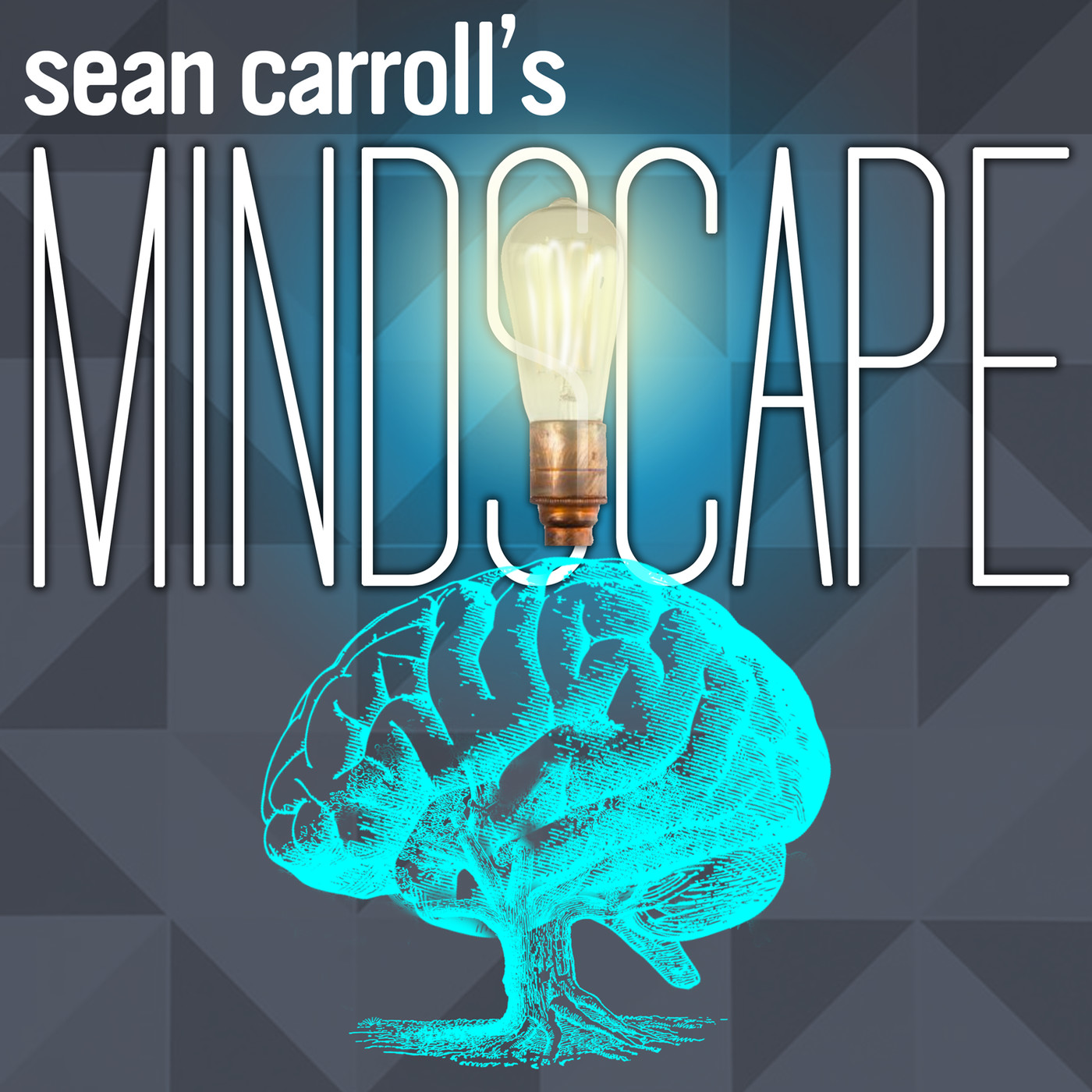
Sean Carroll's Mindscape: Science, Society, Philosophy, Culture, Arts, and IdeasSteven Strogatz on Synchronization, Networks, and the Emergence of Complex BehaviorOne of the most important insights in the history of science is the fact that complex behavior can arise from the undirected movements of small, simple systems. Despite the fact that we know this, we're still working to truly understand it — to uncover the mechanisms by which, and conditions under which, complexity can emerge from simplicity. (Coincidentally, a new feature in Quanta on this precise topic came out while this episode was being edited.) Steven Strogatz is a leading researcher in this field, a pioneer both in the subject of synchronization and in that of small-world networks. He's also an av...
2019-04-081h 14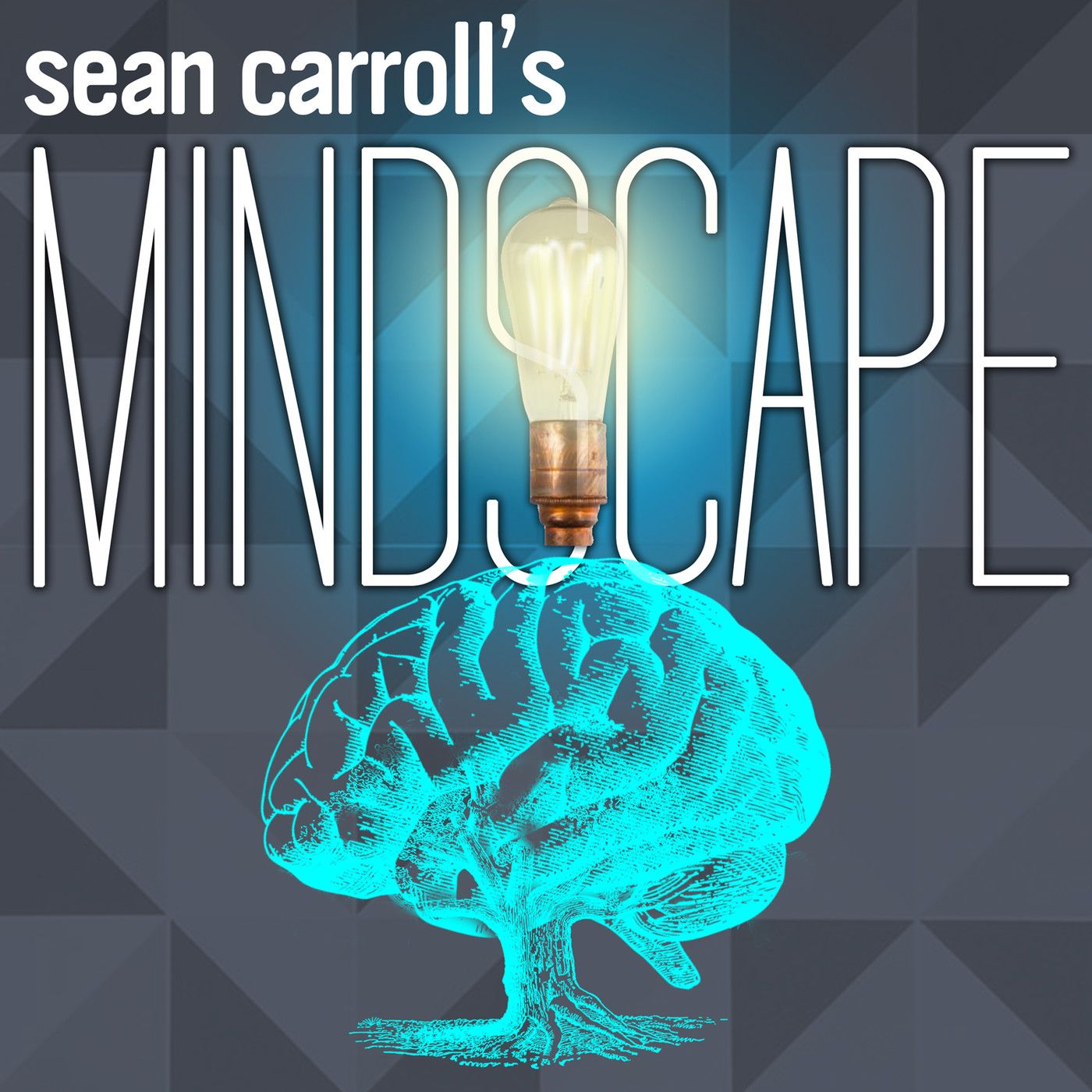
Sean Carroll's Mindscape41 | Steven Strogatz on Synchronization, Networks, and the Emergence of Complex BehaviorOne of the most important insights in the history of science is the fact that complex behavior can arise from the undirected movements of small, simple systems. Despite the fact that we know this, we’re still working to truly understand it — to uncover the mechanisms by which, and conditions under which, complexity can emerge from simplicity. (Coincidentally, a new feature in Quanta on this precise topic came out while this episode was being edited.) Steven Strogatz is a leading researcher in this field, a pioneer both in the subject of synchronization and in that of small-world networks. He’s also a...
2019-04-081h 14
Clear+Vivid with Alan AldaSteven Strogatz Says You Can Understand MathSteven Strogatz possesses a special ability to see into the unseen. How does he do it? Steve is a world class mathematician, who sees through the window of math. But, lucky for us, he’s also a world class communicator. An award-winning professor, researcher, author, and creative thinker, Steve can help anyone (even Alan Alda) understand some of the unseen world of numbers. In this episode, Alan and Steven start from zero, not the number, but from a place of not knowing anything. He emerges from the darkness for a moment as Steve actually gets Alan to understand something th...
2019-03-2645 min
Clear+Vivid with Alan AldaSteven Strogatz Bonus - What to Do When Things Keep Changing!Alan Alda wanted to get off the island quickly. Steven Strogatz explains how an 18th century British clergyman could have helped. In this short bonus episode, Steven helps Alan understand something that he’s wondered about for years. Support the show: https://www.patreon.com/clearandvivid Hosted by Simplecast, an AdsWizz company. See pcm.adswizz.com for information about our collection and use of personal data for advertising.
2019-03-2617 min
Present Value PodcastCalculated LiesSteven Strogatz is the Jacob Gould Schurman Professor of Applied Mathematics at Cornell University. Strogatz’s academic interests include nonlinear dynamics and complex systems. Our conversation begins with a discussion about his 2019 book Infinite Powers: How Calculus Reveals the Secrets of the Universe, which includes a fascinating discussion about how math can be thought of as “a lie that reveals the truth” and a story about the advancement of HIV treatments in the 1990s. We also delve into circadian rhythms and his seminal paper on “small-world” networks.
Links from the Episode
Episode Article: Present Value: Steven Strogatz on the importa...
2018-12-221h 10
UndiscoveredSix DegreesAre you just six handshakes away from every other person on Earth? Two mathematicians set out to prove we’re all connected.
You have probably heard the phrase “six degrees of separation,” the idea that you’re connected to everyone else on Earth by a chain of just six people. It has inspired a Broadway play, a film nerd’s game, called “Six Degrees of Kevin Bacon”...and even a No Doubt song! But is it true? In the ‘90s, two mathematicians set out to discover just how connected we really are—and ended up launching a new field of scien...
2017-06-0632 min
Talk Nerdy with Cara Santa MariaMathematics and Society w/ Steven StrogatzCara chats with Dr. Steven Strogatz ("The Joy of X") about his work as an applied mathematician at Cornell University. They talk about nonlinear dynamics and complex systems, mathematics in popular media, and just how important math is to a functional society.
2017-04-251h 13
The Teach Better PodcastPodcast #45: Inspiring Students with Steven StrogatzIn this episode Professor Steven Strogatz joins us from the Cornell Math Department. He is a world-renowned mathematician, known primarily for his work in non-linear dynamics and chaos theory, and he is an award-winning author of Sync, The Calculus of Friendship, and the Joy of x. He also happens to be one of the best teachers at Cornell. During our a wide-ranging conversation, Steve talks with us about helping students discover for themselves the joys and frustrations of mathematical thinking.
2017-01-0200 min
Mixed Mental ArtsEp97 - Steven StrogatzSteven Strogatz has a really impressive resumé. Besides being a professor at Cornell, he also has the sixth most highly cited paper in all of physics and his 1998 paper "Collective dynamics of small-world networks" was the most highly cited paper in its field for a decade. Cool as all of that is that's not what excites us most about Steven Strogatz, because as you look at his resumé you realize that Strogatz is perhaps the greatest living popularizer of something that underpins all of our lives but most people have (at best) mixed feelings about: math. As the author of a...
2014-01-271h 03
Mixed Mental ArtsEp97 - Steven StrogatzSteven Strogatz has a really impressive resumé. Besides being a professor at Cornell, he also has the sixth most highly cited paper in all of physics and his 1998 paper “Collective dynamics of small-world networks” was the most highly cited paper in its field for a decade. Cool as all of that is that’s not what excites us most about Steven Strogatz, because as you look at his resumé you realize that Strogatz is perhaps the greatest living popularizer of something that underpins all of our lives but most people have (at best) mixed feelings about: math. As the author of a ser...
2014-01-271h 03
Begin The Full Audiobook Everyone Is Talking About — So Breakthrough!Sync by Steven StrogatzPlease visithttps://thebookvoice.com/podcasts/2/audible/187934to listen full audiobooks.
Title: Sync
Author: Steven Strogatz
Narrator: Kevin T. Collins
Format: mp3
Length: 13 hrs and 58 mins
Release date: 01-25-11
Ratings: 4 out of 5 stars, 553 ratings
Genres: Physics
Publisher's Summary:
2011-01-251h 58
Strongly Connected ComponentsStrongly Connected Components Episode 9: Steve StrogatzSamuel Hansen spoke with Steven Strogatz from Cornell University at the Joint Mathematics Meeting in San Francisco where Professor Strogatz presented a talk about his fantastic(review soon to come) new book The Calculus of Friendship. They spoke about: Breadth versus Depth, what a friendship based on mathematics can be, and Samuel even gets Steven to retell a Radio …
2010-01-2727 min